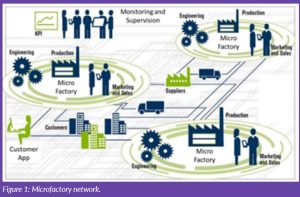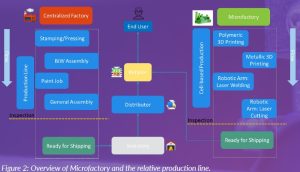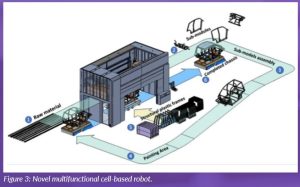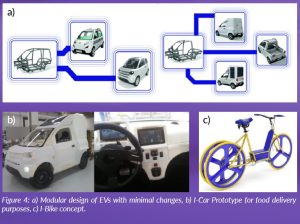Mr Gaetano Patrimia
PRIMA Industrie
Dr Panagiotis Stavropoulos
LMS
The AVANGARD project addresses the integration of three novel processing units into an existing microfactory testbed conceived to produce urban electric vehicles. The units are each state-of-the-art, multipurpose and multifunctional demonstrators, such as:
- robotised integration of laser cutting-shaping-welding for 3D components
- supersonic deposition of metallic powders for high-speed 3D printing
- large volume and high-speed 3D polymeric printing.
The operation of the AVANGARD pilot will be demonstrated manufacturing I-Bikes, I-CARS and innovative battery packs. The proposed innovations target urban mobility, where we are entering an era of rapid transformation and disruption, which also challenges traditional paradigms on manufacturing and business models characterised by an unprecedented speed, scale, and scope of technological change.
Objectives
The project will prepare the environment for novel forms of collaborative distributed manufacturing amongst different EU regions. Innovative value chains will be pursued to overcome the scale and speed being established in planned economies with market development controlled by the governments’ attitudes, targets, and policy tools. To manage the IPRs and the supply chain, AVANGARD will implement a hybrid public-private blockchain platform where the public chain increases security through distributed consensus and validation. The private sidechain increases speed while keeping sensible data stored in the partners’ facilities. The platform will allow auditability of sources, traceability, verification of sources, still with private control of documentation, and compliance to data retention policies. The theme of blockchain-powered manufacturing is relatively new. AVANGARD will address it with Ideas Forward PC, an SME that runs specialised blockchain tech commercialisation projects.
Manufacturing in Europe and the microfactory concept
Europe urgently seeks to reduce waste materials and energy consumption to achieve a minimal carbon footprint on the environment. The European industry plans to reduce greenhouse emissions (GHG) by 55 per cent while keeping in mind the ultimate goal of climate neutrality by 2050 to limit the global temperature increase to 1.5 oC. Current strategies consist of centralised manufacturing plants which store the final products leading to huge inventory (stock). The distributor collects a specific high volume for its region and each of the retailers’ requests from the distributor for the needs of the user/market.
The idea of microfactory was established in today’s automotive industry by distributing cell-based production at regions with high demand. The concept of microfactory only consists of modular production and retailers in the broader region. In contrast to the centralised plants, microfactories only require a moderate upfront investment.
The modular electric vehicle market
The transportation sector strives for sustainable solutions in the form of electric vehicles, moving from fossil-dependent sources to new vehicles. Within the last few decades, the transportation sector is experiencing a transition from fossil fuel-dependent vehicles to more sustainable solutions in the form of electric vehicles (EVs). The need to mitigate greenhouse gas (GHG) emissions, air pollution, and oil dependency derived through the conventional internal combustion engine vehicles (ICEVs) is leading national authorities to set environmental limits to reduce the environmental impact. The global market is already changing in response to the increase of charging infrastructure and environmental concerns, resulting in the exponential growth of the EVs market over the past decade. Nevertheless, even though the EVs market is boosting at a global level (having an increase of 63 per cent between 2018 and 2019), the EV share is still considered rather small, accounting for only approximately 1 per cent of the overall vehicle stock.
The EV market can easily exploit the mass-customisation concept on the 2/3/4-wheel vehicles to provide customers with a wide range of options with minimal changes. In continuation from prior EU projects, AVANGARD partners develop and demonstrate the two different platforms, the I-Car and the I-Bike. The first one can be modified for pick-up track or food delivery, while the latter can be utilised for mobility in the city.
Linking EVs to smart cities
The advent of smart cities and the widespread adoption of the Industrial Internet of Things (IIoT) will enable a radical departure from conventional manufacturing activities in terms of scale, efficiency, and location. Smart cities will have to tackle several challenges to improve the well-being of city dwellers.
However, the implementation of smart cities’ concepts is costly and requires great expertise to secure appropriate social and economic returns on investments. In this sense, modular urban vehicles manufactured in microfactories are inherently worthwhile.
Microfactories are adequately automated, thus requiring less space, energy, raw materials, and labour, all of which contribute to significantly lower operating expenses. They can be installed even in vacant industrial warehouses usually available in the outskirts of most cities, which would further reduce the initial investment. The lower investment means that the break-even is also lower, so more locations are suitable candidates to host a microfactory to serve a certain local market with profits.
Automotive microfactories also enable new innovative and consumer-centred business models. The versatility and adaptability of the manufacturing processes and the modularity of the solutions make microfactories a playground for innovation that allows optimising processes over time. Besides, microfactories operate using a ‘pull’ rather than a ‘push’ model, which means that every vehicle is made to order based on custom specifications, maximising efficiency and minimising inventory. Closer geographic proximity to customers also means closer proximity to customer tastes and preferences.
The smart city approach provides us with an ideal opportunity to develop charging options, particularly the vehicle-to-grid (V2G) concept, which refers to the ability of the EV batteries to function as a backup power source. Briefly, the basic concept of V2G is based on the fact that EVs provide power to the grid while parked. Considering that, on average, cars are stationary 96 per cent of the time, it makes them a potential source of power.
There are also other very important vehicular networks. Notable among these are vehicle-to-vehicle (V2V) and vehicle-to-infrastructure (V2I) communication, two technological innovations which can change current transportation. V2V communication offers solutions to problems through a wide range of applications, perhaps the most important of which are those related to safety.
The digital infrastructure of microfactory
Digital transformation in manufacturing is essential in optimising processes, providing safer workspaces, and gaining higher consistency. With the nature of large-scale manufacturing firms covering vast, remote areas and being made of dense structures, connectivity should be reliable and secure. The development of a cloud-based platform enables the communication and collaboration among the hardware and software industrial components along with standard interfaces for the machinery, monitoring, control, and other high-level software. The digital infrastructure promotes a seamless production system with flexible connectivity, interoperability, and security for enhanced planning, optimisation, and operation features. In addition, a hybrid public-private blockchain platform will enhance the traceability and the trustability of transactions among different actors such as clients, partners, and suppliers.
Demonstrators and future outlook
The outcome of the AVANGARD will be two prototypes in the microfactory facilities of IFEVS. Firstly, the I-Car will be demonstrated, which can be manufactured with minimal variations in the production line. I-Cars models utilised the same chassis, battery packs, powertrain and auxiliaries while differing in the front panel. Secondly, the I-Bike will be demonstrated as a solution to the modern mobility issues with high safety, interactivity, ergonomics and efficiency features. Both solutions provide personalised and customised vehicles depending on the client’s needs while applying the most demanding test certificates on safety.
The AVANGARD EU project aims to increase innovation on new production lines (the so-called microfactories) along with high flexibility, customisation, automation and data management. The results of the AVANGARD can be exploited for the creation of microfactories across Europe (distributed manufacturing) by relying on cell-based production plants. The energy use and raw material from the microfactories are expected to be lower than the current industrial practices regarding the environmental KPIs, while the capital and operational expenditure will be at a fraction.
Additionally, it is worth mentioning that the SARS-CoV-2 pandemic triggered a citizen preference for smart individual transport in cities with smaller vehicles. Large automotive corporates faced difficulties due to the supply chain availability and labour restrictions; therefore, local industrial practices such as the microfactories proved to be a good solution for domestic demands. More results and related publications can be found here: http://www.avangard-project.eu/.
PROJECT NAME
Advanced manufacturing solutions tightly aligned with business needs (AVANGARD)
PROJECT SUMMARY
The AVANGARD project aims to integrate three novel process units into an existing microfactory testbed conceived to produce urban electric vehicles by utilising 3D-printed parts. The project will prepare the environment for novel forms of collaborative distributed manufacturing amongst different EU regions.
PROJECT PARTNERS
PRIMA Industrie (Italy), IFEVS (Italy), MA Srl (Italy), UNINOVA (Portugal), INTROSYS SA (Portugal), LMS (Greece), HMU (Greece), GIZELIS (Greece), IDFC (Greece), RODSTEIN (Finland), VAASA (Finland), UNITO (Italy), IPM (Italy), MORPHICA (Italy), STGNB 2 SAS (France), ST ROUSSET (France), CIDAUT (Spain), POLEVS (Poland), THINKSTEP AG (Germany), BWI (Belgium), SUPSI (Switzerland), MASSIVIT (Israel).
PROJECT LEAD PROFILE
PRIMA INDUSTRIE SpA is a worldwide leader in industrial laser systems and sheet metal working machines. Today, the company has about 1700 employees with headquarters in Italy, where there the new technological centre of the group resides. Prima also has different facilities in the world such as Finland, the USA, and China.
PROJECT CONTACTS
Coordinator
PRIMA Industrie – Mr Gaetano Patrimia
+39 011 410 36 24
Dissemination
LMS – Dr Panagiotis Stavropoulos
FUNDING
This project has received funding from the European Research Council (ERC) under the European Union’s Horizon 2020 research and innovation programme under grant agreement No. 869986.
Figure 1: Microfactory network.
Figure 2: Overview of Microfactory and the relative production line.
Figure 3: Novel multifunctional cell-based robot.
Figure 4: a) Modular design of EVs with minimal changes, b) I-Car Prototype for food delivery purposes, c) I-Bike concept.





